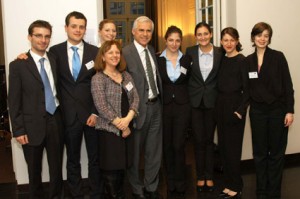
French National Round Final Judges Leila Sadat, Nicola Bonucci and Jennifer Younan pictured with the winning team from the University of Paris I (Sorbonne)
I had the privilege to author the Compromis for this year’s Jessup problem, which you can find on the website of the International Law Students Association, here. The scenario resembles real life, involving the use of drone attacks against an ethnic minority, a ban against a particular garment worn only by women for religious reasons, and corruption and bribery. My primary responsibility was to write the drone attack and “Mavazi” ban portion of the problem, and to weave the OECD corruption and bribery issues in so the text formed a coherent whole. I was incredibly fortunate in this task to have Larry Johnson, Former UN Ass’t Secretary General for Legal Affairs, and Nicola Bonucci, OECD General Counsel, as my partners in this endeavor. The OECD celebrated it’s 50th anniversary this year, and thought that an OECD related Jessup problem would be a wonderful complement to the other activities it had planned.
My agenda was more perhaps subversive: to force a sophisticated conversation about the use of drones and targeted killing in war and peace time, as well as link those issues to human rights and especially women’s human rights (think US drone attacks in Afghanistan and Pakistan). (The Harris World Law Institute held a debate on this issue last fall).
The provocation for the problem was Harold Koh’s impassioned defense of US drone attacks at the 2010 Annual Meeting of the American Society of International Law, which seemed to gloss over some very fundamental questions, including the legality of targeted killings outside a theatre of war, and the application of international human rights law. The problem was designed, of course, so all sides of the issue would be explored and justifiable; as were the issues relating to the ban on the “Mavazi” a fictitious garment resembling a burka and the OECD corruption and bribery issues.
I think all three coauthors were thrilled by how the students brought the problem to life, which I witnessed first hand in judging the French National Rounds of the Competition held in Paris on February 19, 2011 as well as the semi-final rounds of the international rounds of the competition in Washington on March 26th, and in the wonderful questions posed by students at a “meet the authors” event sponsored by ILSA and the Fletcher School. I was particularly moved when a member of the the Israeli team spoke up at the Fletcher School event and said the problem had really “hit home” for her, and by the comment of a female student from Iran, who talked about her own frustration at garments imposed upon women.
There is never a “winner” or “loser” in Jessup in terms of the substance of the problem, and if the compromis sparks a real conversation and deep reflection about hard and current issues, it can be considered a success. Based upon what I saw and heard, this happened for the literally hundreds of teams from all over the world who worked on this year’s Compromis, including teams from Afghanistan, Israel, Pakistan, Iraq, Africa, Latin America, Europe, 120 U.S. teams, and even, for the first time, a team from the West Bank. These fine young people are the future!
The students crafted great arguments on all sides of the issues (including some we had not thought of when we wrote the problem), and the World Cup final rounds, between Columbia (USA) and University of Sydney (Australia) were nothing short of spectacular. All of us went away from this year’s Jessup season exhausted and elated.
After Jessup, though, comes real life. U.S. drone strikes continue in Pakistan and the Loi sur la dissimulation du visage just went into effect in France. Both controversies are likely to be with us for some time.
